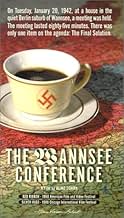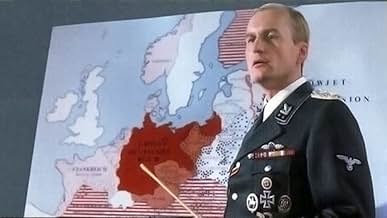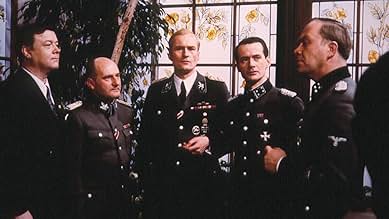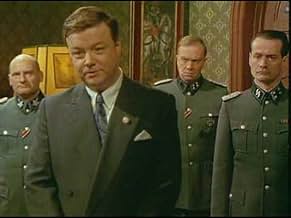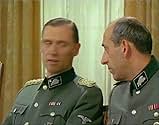Die Wannseekonferenz
- Filme para televisão
- 1984
- 1 h 25 min
AVALIAÇÃO DA IMDb
7,7/10
1,4 mil
SUA AVALIAÇÃO
Adicionar um enredo no seu idiomaAt the Wannsee Conference on January 20, 1942, senior Nazi officials meet to determine the manner in which the so-called "Final Solution to the Jewish Question" can be best implemented.At the Wannsee Conference on January 20, 1942, senior Nazi officials meet to determine the manner in which the so-called "Final Solution to the Jewish Question" can be best implemented.At the Wannsee Conference on January 20, 1942, senior Nazi officials meet to determine the manner in which the so-called "Final Solution to the Jewish Question" can be best implemented.
- Direção
- Roteirista
- Artistas
Friedrich G. Beckhaus
- Heinrich Müller
- (as Friedrich Beckhaus)
Hans-Werner Bussinger
- Martin Luther
- (as Hans W. Bussinger)
Werner Asam
- Heydrich's Adjutant
- (não creditado)
Avaliações em destaque
A fantastic film that needs to be released domestically on DVD. For the people who don't mind reading subtitles, this is a very, very good version of the more recent "Conspiracy". There is something more to be offered here by the fact that German actors are playing the roles. I do very much like Kenneth Branagh's performance as the manipulative Hydrich (most captivating since David Warner's double performance in "Holocaust" and "Hitler's SS, Portrait of Evil").
The film, which covers in real time the conference at Wansee where the framework of the "Final Solution" was set, is amazing. The methodical way in which it is handled, shows the real danger of evil when it it's perpetration is done on in a methodical/business like manner.
I think this film is a lesson for whomever thinks that the sins of the past can not be repeated in a modern society!
The film, which covers in real time the conference at Wansee where the framework of the "Final Solution" was set, is amazing. The methodical way in which it is handled, shows the real danger of evil when it it's perpetration is done on in a methodical/business like manner.
I think this film is a lesson for whomever thinks that the sins of the past can not be repeated in a modern society!
Heinz Schirk masterfully--albeit painfully--captures true Nazi "spirit" as it unfolded at the Wannsee Conference in Berlin, 1942, where the "final solution" was further refined and "perfected." Not only are actors Mattausch, Bockmann, and Beckhaus dead ringers for Heydrich, Eichmann, and Muller, respectively, but Schirk brilliantly highlights the bureaucratization and cold abstraction of Nazi mass murder of the European Jewry.
This movie is a fascinating 'fly on the wall' look at the infamous Wannsee Conference held on 20 Jan 1942. As they snack on food and sip on fine French Wines, the 'paper pushers', 'yes men', 'intellectuals' and 'hatchet men' of the Third Reich debate the fate of 11 million people.
There is another movie that also looks at this same 90 min. meeting called 'Conspiracy' - which is available on DVD & VHS through Amazon.com. Although the 'WannseeKonferenz' is the better movie (and 'Conspiracy' sometimes comes across as a flashy imitation), I strongly urge everyone to watch both movies. Both movies have the same people attending the conference, but how each attendee is portrayed at the conference is strikingly different. Most of the attendees in 'Conspiracy' (except for Dr. Klopfer) are viewed as flawed intellectuals, but full of grace, charm and manners (which makes a nice stark comparison with what they are discussing). Almost all of the attendees in 'The Wannsee Conference' (except for the female secretary) are shown as crude, corrupt pigs that differ with each other only as to how to divide their 'power'. In particular after watching both versions, I am most curious as to the 'real' Major Lange. The crude drunken Major Lange of 'The Wannsee Conference' seems more likely to be butchering 1000's of Jews at Riga than the soft spoken, charming, well mannered Major Lange of 'Conspiracy'.
There is another movie that also looks at this same 90 min. meeting called 'Conspiracy' - which is available on DVD & VHS through Amazon.com. Although the 'WannseeKonferenz' is the better movie (and 'Conspiracy' sometimes comes across as a flashy imitation), I strongly urge everyone to watch both movies. Both movies have the same people attending the conference, but how each attendee is portrayed at the conference is strikingly different. Most of the attendees in 'Conspiracy' (except for Dr. Klopfer) are viewed as flawed intellectuals, but full of grace, charm and manners (which makes a nice stark comparison with what they are discussing). Almost all of the attendees in 'The Wannsee Conference' (except for the female secretary) are shown as crude, corrupt pigs that differ with each other only as to how to divide their 'power'. In particular after watching both versions, I am most curious as to the 'real' Major Lange. The crude drunken Major Lange of 'The Wannsee Conference' seems more likely to be butchering 1000's of Jews at Riga than the soft spoken, charming, well mannered Major Lange of 'Conspiracy'.
I second the "fly on the wall" comment, this one almost has a cinema verite feel to it. One thing that impressed me was the business-like feel to, no table thumping speeches proclaiming loyalty to the Fuehrer or railing about the "Jewish Problem." Instead a group of second and third rank officials-important cogs in a machine but people little known outside their particular spheres-are discussing how to implement the orders of their superiors. In some respects it's almost like a sales meeting, I recall Heydrich says to one participant "We're taking it off your hands" and at the end he telephones Himmler and says "Our position was accepted across the board.", again, like a sales representative telling his boss that they've won the Big Contract. Frightening way to look at it but that's the way it was.
Far above the bathetic histrionics of Kenneth Branagh in the recent "Conspiracy", this crisply chilling, almost real-time reenactment is among the most convincing works of historical evocation on celluloid.
Not so much because its overall interpretation is historically valid: as I noted in my review of "Conspiracy", there are grave doubts whether the Wannsee meeting can bear anything like the watershed significance historians imputed to it between c. 1960 and 1980. More recent research has pointed to the Conference being more or less what the one remaining "Protokoll" (summary minutes) stated: a second-level pow-wow of bureaucrats to arrange for the deportation of Jews to the German-occupied East, not a master plan for their destruction cooked up by leading Nazis.
But that is by the way. "Wannseekonferenz" ably conveys the peculiar ethos of German (by no means all Nazi) officials and soldiers in the pivotal years of World War Two, when the nation seemed to be on top of Europe but was already getting jitters about its staying power. As the Interior Ministry's moderate Dr Stuckart, between wipes of his nose, points out: neither the British Empire nor the Soviet Union has yet been defeated, America is about to join in (the date is a month after Pearl Harbor) and there is danger in sweeping assimilated Jews and mixed-race people out of the Reich. Some will escape to become mortal enemies of it when they might be co-opted. Other participants crudely call for total banishment of Jewry from the Altreich and the Polish "Generalgouvernement", grumbling about disease; but there are war-production and morale arguments on the other side, and the uniforms who start by seeming to spring wholesale evacuation on the suits as a fait accompli- Heydrich and "my Jewish consultant, Eichmann"- are willing to ponder exemptions.
All this is a far cry from the Goldhagenesque "eliminationist antisemitism" uncritically portrayed in "Conspiracy". The German film is a more plausible picture of the clashes and compromises, the tired banter and one-upmanship, the relief of dirty jokes and the solemn courtesies one would expect of a gaggle of Teutonic bureaucrats who don't feel as assured of victory as they have to pretend. The film is little more than facial expressions and dialogue, batted to and fro across the table; but every actor is right inside his part. The sense of a warped community is potent, and the prowling encirclement by Heinz Schirk's camera reinforces this solidarity instead of just trying to fluff up the monotony of a bunch of men (and one shockable stenographer) talking.
Dietrich Mattausch looks far more like the real Reinhard Heydrich- tall, elegant fencer and violinist with a streak of treachery- than stocky little Branagh. His unfailing politeness, with a hint of cold steel underneath, is more convincing than Branagh's Demon King. This man knows what he wants, but his chairmanship is skilfully emollient.
Gerd Bockmann's Eichmann is assiduous and dispassionate like the real Adolf E, who had no great personal animus towards Jews but was determined to get ahead in his sordid profession of "dispatcher". Peter Fitz as Stuckart, the Jonah of the gathering, hints at distaste for the whole business while manfully arguing a pragmatic case for letting sleeping dogs lie. Among the smaller parts, Martin Luttge as Major Dr Rudolf Lange- intellectual turned persecutor in an SS Special Action Group- stands out for his affectation of rough, half-reluctant practicality, telling civilian papershufflers the score.
Inevitably a few embroideries have crept in: Heydrich's pursuit of the secretary, Lange's dog, the contemptuous anecdote about the Papal Nuncio. As if tacitly admitting the lack of hard evidence for orchestrated genocide from the minutes, the screenplay chucks in a throwaway line: Heydrich speaks of finding a new way of killing Jews fast by "learning to take the Fuhrer literally". Stuckart tells Dr Kritzinger that this refers to a "Mein Kampf" passage about how the Great War could have been won if subversive, high-ranking German Jews back home had been held under poison gas. We are supposed to infer a whiff of Zyklon B from this; but as is clear in context, Hitler meant that those Jews should have had to inhale British poison gas as front-line soldiers, like himself.
Such gaseous garnishings were probably required to make the film an accepted part of the curriculum in the guilt-ridden German system of historical re-education. But they do not seriously detract from this superbly atmospheric chamber piece.
Not so much because its overall interpretation is historically valid: as I noted in my review of "Conspiracy", there are grave doubts whether the Wannsee meeting can bear anything like the watershed significance historians imputed to it between c. 1960 and 1980. More recent research has pointed to the Conference being more or less what the one remaining "Protokoll" (summary minutes) stated: a second-level pow-wow of bureaucrats to arrange for the deportation of Jews to the German-occupied East, not a master plan for their destruction cooked up by leading Nazis.
But that is by the way. "Wannseekonferenz" ably conveys the peculiar ethos of German (by no means all Nazi) officials and soldiers in the pivotal years of World War Two, when the nation seemed to be on top of Europe but was already getting jitters about its staying power. As the Interior Ministry's moderate Dr Stuckart, between wipes of his nose, points out: neither the British Empire nor the Soviet Union has yet been defeated, America is about to join in (the date is a month after Pearl Harbor) and there is danger in sweeping assimilated Jews and mixed-race people out of the Reich. Some will escape to become mortal enemies of it when they might be co-opted. Other participants crudely call for total banishment of Jewry from the Altreich and the Polish "Generalgouvernement", grumbling about disease; but there are war-production and morale arguments on the other side, and the uniforms who start by seeming to spring wholesale evacuation on the suits as a fait accompli- Heydrich and "my Jewish consultant, Eichmann"- are willing to ponder exemptions.
All this is a far cry from the Goldhagenesque "eliminationist antisemitism" uncritically portrayed in "Conspiracy". The German film is a more plausible picture of the clashes and compromises, the tired banter and one-upmanship, the relief of dirty jokes and the solemn courtesies one would expect of a gaggle of Teutonic bureaucrats who don't feel as assured of victory as they have to pretend. The film is little more than facial expressions and dialogue, batted to and fro across the table; but every actor is right inside his part. The sense of a warped community is potent, and the prowling encirclement by Heinz Schirk's camera reinforces this solidarity instead of just trying to fluff up the monotony of a bunch of men (and one shockable stenographer) talking.
Dietrich Mattausch looks far more like the real Reinhard Heydrich- tall, elegant fencer and violinist with a streak of treachery- than stocky little Branagh. His unfailing politeness, with a hint of cold steel underneath, is more convincing than Branagh's Demon King. This man knows what he wants, but his chairmanship is skilfully emollient.
Gerd Bockmann's Eichmann is assiduous and dispassionate like the real Adolf E, who had no great personal animus towards Jews but was determined to get ahead in his sordid profession of "dispatcher". Peter Fitz as Stuckart, the Jonah of the gathering, hints at distaste for the whole business while manfully arguing a pragmatic case for letting sleeping dogs lie. Among the smaller parts, Martin Luttge as Major Dr Rudolf Lange- intellectual turned persecutor in an SS Special Action Group- stands out for his affectation of rough, half-reluctant practicality, telling civilian papershufflers the score.
Inevitably a few embroideries have crept in: Heydrich's pursuit of the secretary, Lange's dog, the contemptuous anecdote about the Papal Nuncio. As if tacitly admitting the lack of hard evidence for orchestrated genocide from the minutes, the screenplay chucks in a throwaway line: Heydrich speaks of finding a new way of killing Jews fast by "learning to take the Fuhrer literally". Stuckart tells Dr Kritzinger that this refers to a "Mein Kampf" passage about how the Great War could have been won if subversive, high-ranking German Jews back home had been held under poison gas. We are supposed to infer a whiff of Zyklon B from this; but as is clear in context, Hitler meant that those Jews should have had to inhale British poison gas as front-line soldiers, like himself.
Such gaseous garnishings were probably required to make the film an accepted part of the curriculum in the guilt-ridden German system of historical re-education. But they do not seriously detract from this superbly atmospheric chamber piece.
Você sabia?
- CuriosidadesAt the time of the film's production, SS-Oberführer Dr Gerhard Klopfer was the only living attendee of the Wannsee Conference. He died on January 29, 1987 at the age of 81.
- Erros de gravaçãoAdolf Eichmann is shown in the film wearing a Waffen-SS infantry officer's uniform complete with the SS runes unit patch. Eichmann was in fact a security police colonel and therefore should have displayed a blank security service collar patch with green police piping.
- Citações
Adolf Eichmann: There were women... children...
Reinhard Heydrich: Women and children are Jews too.
- ConexõesRemade as A Conferência (2022)
Principais escolhas
Faça login para avaliar e ver a lista de recomendações personalizadas
Detalhes
- Data de lançamento
- Países de origem
- Idiomas
- Também conhecido como
- Hitler's Final Solution: The Wannsee Conference
- Locações de filme
- Empresas de produção
- Consulte mais créditos da empresa na IMDbPro
Contribua para esta página
Sugerir uma alteração ou adicionar conteúdo ausente

Principal brecha
By what name was Die Wannseekonferenz (1984) officially released in India in English?
Responda
